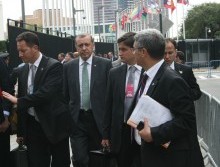With extensive protests continuing in Turkey, Turkish Prime Minister Recep Tayyip Erdoğan hinted that he too can unleash crowds of supporters. And that didn’t sit so well with the leader of the main opposition political party, who said it sounds like the type of threat a dictator would make.
“It is not democracy when you say ‘I hold control of 50 percent of the society and I can put them on the field with sticks in their hands whenever I want to, and then a battle will come out,’ this is the discourse of dictators,” the Hurriyet Daily News quoted Republican People’s Party (CHP) leader Kemal Kılıçdaroğlu as saying on Erdoğan’s comment that he would be hard pressed to prevent half of Turkey from jumping into the tense situation.
In some ways the opposition’s strong words about Turkish Prime Minister Erdoğan is nothing more than political rhetoric—he wins if Erdoğan is in trouble. At the same time, Erdoğan has long been accused of overstepping his authority and curtailing democracy. While that didn’t start the protests in Turkey, concerns about freedom have added fuel to the fire for the demonstrators.
Turkey is a force in the Middle East—it has long been a key ally of the US and Europe in the region and today is important in dealing with the Syrian civil war. What’s more, Turkey has aspirations of joining the European Union.
But having a prime minister who’s accused of behaving as a dictator won’t sit well with Europe. And in the meantime the protests raise questions about the long-term stability of Turkey’s current government.
Despite being its importance in trying to end the Syrian civil war as quickly as possible, Turkey may need to step aside as it straightens itself out. It’s good for you if Turkey becomes more democratic, but the process may complicate an already chaotic Middle East.
(By Joshua Spurlock, www.themideastupdate.com, June 4, 2013)

